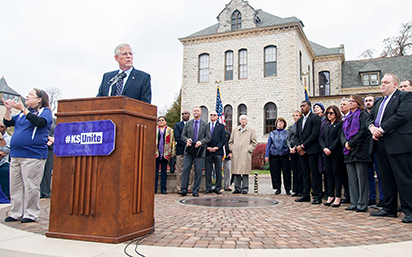
Photo gallery: K-State community celebrates family and spirit of unity with KSUnite event
K-Staters may come from different backgrounds and places, but together we form one family.
The K-State community came together Nov. 14 to celebrate this unity and to reaffirm K-State’s commitment to safety, inclusion and compassion for all at a special event called KSUnite. Kansas State University administration approved a rare closure of all classes and offices from 1-3 p.m., and in unison students, faculty and staff from across campus walked to Anderson Hall lawn.
The program was hosted by Jack Ayres, student body president, and Darrell Reese Jr., president of K-State’s Black Student Union and 2018 Student Ambassador. President Richard Myers ’65 provided a message of unity and outlined steps that all K-Staters can take as the community moves forward.
“It’s time for all of us to stand up as a family, as a community, to unite around our values,” Myers said.
The event was a powerful expression of solidarity and the spirit of family that defines K-State.
“We are going to uphold what it means to be a family,” Reese addressed K-Staters. “…Once you step foot on this campus or in this community, no matter where you come from, the color of your skin, or your religious background, together we make a family. It should be your duty and your highest aspiration that the person to the left of you, or to the right of you, or the person that does not look like you, feels that they are a part of this family, and that they are safe in this family.”
View photos from the event below.
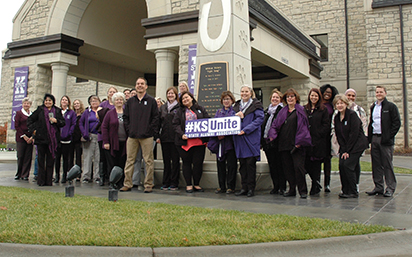
K-State Alumni Association staff walked together from the Alumni Center to Anderson Hall for the KSUnite event. (Photo: Lindsay Porter ’04, ’07)
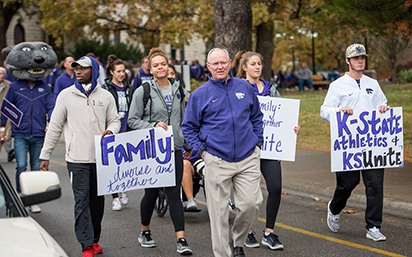
K-State Athletics director Gene Taylor and other representatives from K-State Athletics also joined the Unity Walk on Nov. 14. (Photo: Kansas State University)
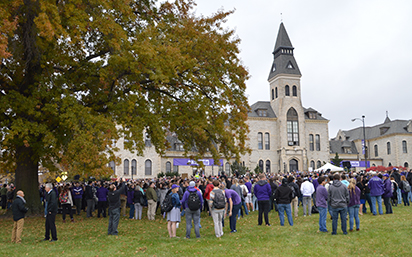
Students, faculty and staff joined together for the KSUnite rally on the Manhattan campus. (Photo: Tim Schrag ’12)
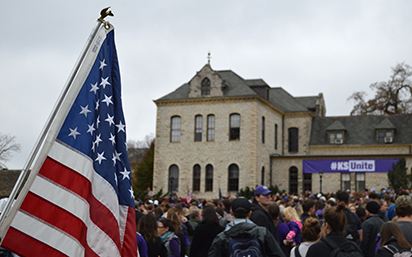
Watch a recorded live stream of the KSUnite event. (Photo: Tim Schrag ’12)
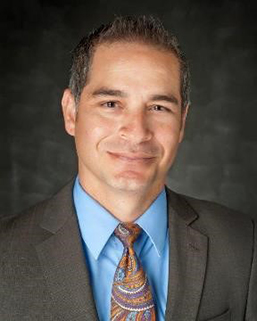 Also on Nov. 14, K-State announced Adrian Rodriguez as the university’s associate
vice president for student life of diversity and multicultural student affairs, effective
Dec. 4.
Also on Nov. 14, K-State announced Adrian Rodriguez as the university’s associate
vice president for student life of diversity and multicultural student affairs, effective
Dec. 4.
Rodriguez will provide strategic leadership for university strategies to increase recruitment, matriculation, support, retention and graduation of multicultural students. He will collaborate with many departments, offices and academic units to develop programs and services to enhance students’ academic, social and emotional success.
“It is an absolute honor to be joining the K-State family,” Rodriguez said. “Being a part of a university committed to creating a welcoming, safe and inclusive environment for all students is exactly the place my family and I want to be and K-State embodies that very spirit. I am eager to work hand in hand with the great students, faculty and staff of Kansas State University.”
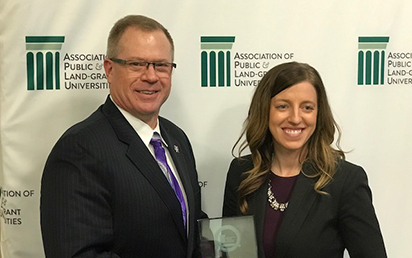
K-State wins national Innovation Award from the Association for Public and Land-grant Universities
Kansas State University has been named winner of a national award for extraordinary economic engagement efforts.
The Association of Public and Land-grant Universities named the university the winner of its Innovation Award at its fifth annual Commission on Innovation, Competitiveness and Economic Prosperity’s Innovation and Economic Prosperity University Awards on Nov. 12.
Economic engagement efforts include universities working with public and private sector partners in their states and regions to support economic development through a variety of activities, including innovation and entrepreneurship, technology transfer, talent and workforce development, and community development. K-State was recognized for outstanding work in technology transfer, entrepreneurship and business development.
Peter Dorhout, vice president for research, and Rebecca Robinson ’09, ’13, director of economic development at the Kansas State University Institute for Commercialization, accepted the award on behalf of the university at the association’s annual meeting in Washington, D.C.
“Building the economic prosperity of Kansas has always been a priority at K-State, and we are pioneering efforts to understand what it means to be a 21st-century land-grant university,” said K-State president Richard Myers ’65.
According to Myers, advancing prosperity in our complex environment requires building innovative partnerships.
“K-State has excelled at embracing the diversification, technology and business-friendly approaches that collaboration and economic development require,” he said.
The university's award application highlighted the K-State Knowledge Based Economic Development partnership, the Center for the Advancement of Entrepreneurship and the K-State Institute for Commercialization. Knowledge Based Economic Development has facilitated partnerships with Manhattan and private sector organizations that have resulted in the creation of hundreds of jobs in the area since the organization’s founding in 2008. The Center for the Advancement of Entrepreneurship provides mentorship, support and funding to entrepreneurs. In the last academic year, the center awarded more than $256,000 in grants to entrepreneurs. Finally, the K-State Institute for Commercialization facilitates technology transfer, strategic partnerships with industry, and research and development collaborations. The institute facilitates an average of 500 unique industry interactions each year. In the past five years, those interactions have led to nearly $15 million in corporate-generated cash royalties, funded research and company equity.
Dorhout said the organizations featured in the award application are representative of the university’s overall approach to engagement.
“We have developed a culture of engagement at K-State that starts with our faculty, staff and students, all of whom are working to ensure that our research makes it to the marketplace to help improve the lives of our citizens,” Dorhout said.
Dorhout noted that the university has developed processes that facilitate collaboration.
“We have built many partnerships in Manhattan and around the state, and K-State research and education programs add value to the people and the industries in the state,” he said. “We have more than 480 active collaborations with companies, plus groups facilitating the business development that creates jobs in Kansas.”
The Association of Public and Land-grant Universities’ Commission on Innovation, Competitiveness and Economic Prosperity, which brings together public university leaders focused on economic engagement issues, designed and implemented the Innovation and Economic Prosperity Awards program. To be eligible for an award, an institution must first earn the Innovation and Economic Prosperity University designation from the association, which K-State received earlier in 2017. To receive that designation, universities conduct a rigorous self-study of their economic engagement efforts that includes input from external stakeholders and results in a growth and improvement plan.
The other finalists for the awards were the Georgia Institute of Technology, Iowa State University, Pennsylvania State University and the University of Maryland.

’Tis the season for purple pride: Holiday gifts for K-Staters
Help your favorite Wildcat show off their purple pride all year round! The K-State Alumni Association offers a variety of exclusive gifts that would make great holiday surprises for a K-Stater. Shop through our gallery below, or find more items at the Alumni Association’s Shop Purple page.
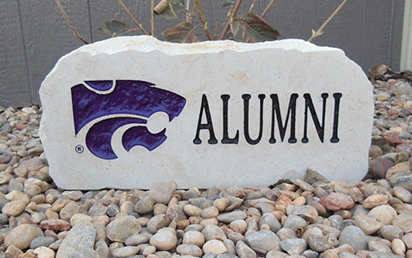
K-State Stones
K-State Stones are a great way to display K-State spirit! These locally-made stones come in a variety of K-State designs and are made of top-quality limestone. Personalized stone options also are available. (Allow a minimum of 3-4 weeks from order date for pickup or shipping. Note: Stones ordered now may not be delivered until after the holidays.)
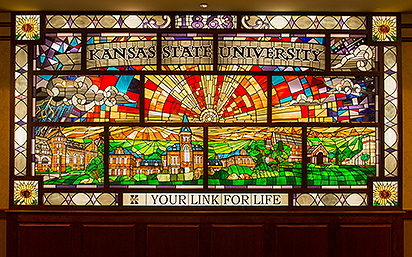
Alumni Association Membership
Help your favorite K-Stater stay connected to the “spot they love full well” with a gift membership to the K-State Alumni Association. Benefits include the K-Stater magazine, annual wall calendar, valuable discounts and more.
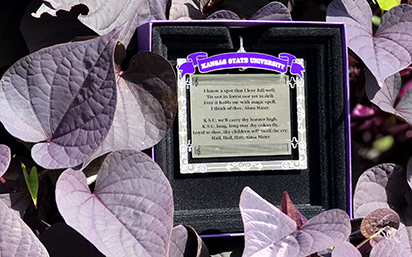
Ornament
Include a favorite K-State tradition with your holiday decorations this year — the Alumni Association’s 2017 holiday ornament features the lyrics to the K-State Alma Mater. Past ornaments — including the 2016 design featuring the K-State Marching Band and the 2015 design featuring a Powercat wreath — also are available. (Please order by Friday, Dec. 8, to allow for holiday delivery.)
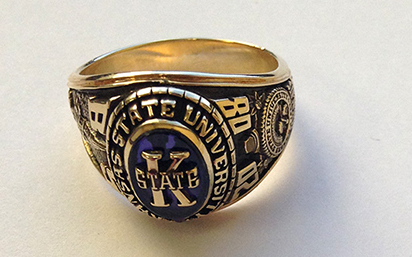
Official K-State Ring
The official K-State Ring reflects the university’s proud history and tradition with timeless elegance. (Note: Rings ordered now may not be delivered until after the holidays.)

K-State Wine
A bottle of K-State Wine adds a special touch to holiday gatherings. Various designs are available, including the Powercat, the university seal and more. (Please order by Friday, Dec. 8, to allow for holiday delivery.)
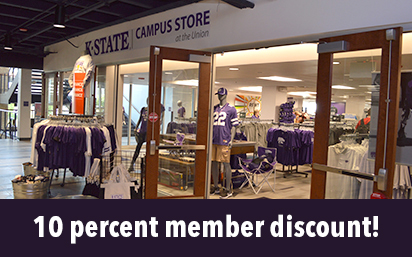
K-State Campus Store discount
As you’re planning your holiday shopping, don’t forget — Alumni Association members receive a 10 percent discount on apparel and gift items at the K-State Campus Store on the Manhattan and Polytechnic campuses. Members, learn how to use your online Campus Store discount code in the Around K-State section in the winter issue of K-Stater magazine.

Gift of growth: Alumni and friends invited to help with K-State tree planting project
As the trees at Kansas State University change throughout the seasons, they add beauty to the campus — blossoming in the spring, offering shade in the summer, and turning colors in the fall. The tree-filled campus is no doubt part of the reason K-State was recently named the “most beautiful college in Kansas” by Travel + Leisure.
Alumni and friends are invited to help keep K-State a beautiful, tree-filled campus. The university, the K-State Alumni Association, Kansas State University Foundation, Manhattan Rotary and Manhattan Konza Rotary are partnering on a project to plant trees on the university’s Manhattan campus.
K-State will face some tree-related challenges in the next few years due to the anticipated arrival of the emerald ash borer, which may decimate about 225 ash trees on campus, according Mark Taussig ’79, ’90, project manager for campus planning and project management. K-State also loses 25-50 trees per year due to old age and a variety of environmental conditions and pathogens.
“Because of these challenges, we would be thrilled to partner with K-State faculty, staff, alumni and friends to plant new trees on campus,” Taussig said.
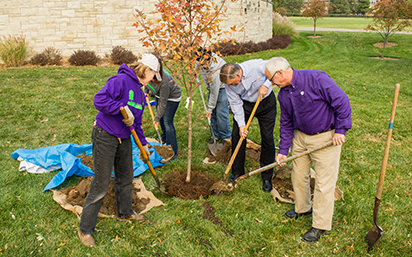 The two local Rotary Clubs initially approached the university as a site to plant
trees as part of a Rotary International challenge to plant one tree for each Rotarian.
The K-State Alumni Association and KSU Foundation purchased the first two trees to
help kickstart the program.
The two local Rotary Clubs initially approached the university as a site to plant
trees as part of a Rotary International challenge to plant one tree for each Rotarian.
The K-State Alumni Association and KSU Foundation purchased the first two trees to
help kickstart the program.
“I hope we plant trees where the shade and beauty benefit as many students as possible,” said Rod Harms ’82, president of Manhattan Konza Rotary.
The Greater Manhattan Community Foundation is collecting donations for the tree project. You can make a tax-deductible donation to the K-State/Rotary Tree Partnership online. Trees cost between $100-$200 each, and all donation amounts are accepted.
K-State has been designated by the Arbor Day Foundation as a Tree Campus USA since 2013. For Arbor Day 2017, the university planted six trees, including one in honor of President Richard Myers ’65. Learn more about the Tree Campus USA program.
Photo: K-State organizations and local Rotary groups have partnered to plant trees on the Manhattan campus. Pictured left to right are Cathie Lavis ’93, ’05, associate professor and Extension specialist: landscape management; Horticulture students Sarah Diggs, junior, Circleville, Kansas, and Markis Hill, senior, Eudora, Kansas; Manhattan Rotary president Vern Henricks ’78, ’80; Manhattan Rotary Community Service and Giving Committee co-chair and One Rotarian One Tree Project chair Mike Dodson ’79; and Manhattan Konza Rotary president Rod Harms ’82. (Photo: David Mayes ’96)
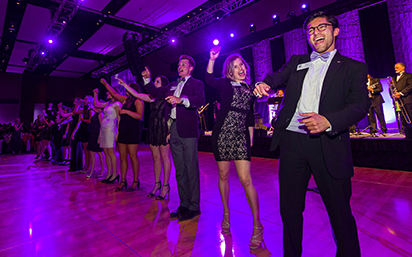
You’re invited to join us for a Wabash CannonBall event in 2018
Allison Nigg’s Wabash CannonBall scholarship will help her continue her family’s legacy at Kansas State University. Adam Krehbiel said his Wabash CannonBall scholarship will take “some of the stress away” from paying for college. For Nathan Jackson, his Wabash CannonBall scholarship will give him “a great start at K-State” and help him get involved with student organizations and achieve his goal of studying abroad.
The goal of the K-State Alumni Association’s Wabash CannonBall program is to help make dreams like these come true for future K-Staters. You can be a part of the tradition in 2018 through one of our upcoming Wabash CannonBall events.
The Wabash CannonBalls are black-tie galas that provide an opportunity for K-State alumni and friends to dine, dance and raise scholarship funds for students from their area. The first Wabash CannonBall took place in Kansas City in 2007, and has since expanded to Colorado, Houston and North Texas.
The program draws its name from the well-loved song Wabash Cannonball, and this year’s events will commemorate the 50th anniversary of a significant event in Wabash Cannonball history. When Nichols Gym burned in December 1968, the fire destroyed most of the K-State band’s instruments and sheet music. However, former band director Phil Hewett ’70 had sheet music at his home, which included the Wabash Cannonball, now a favorite K-State tradition.
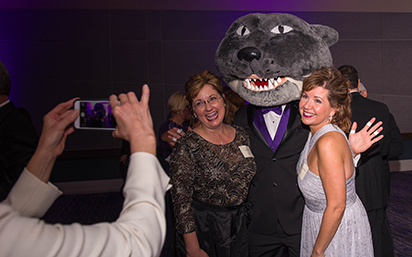 The Wabash CannonBall program now helps introduce new students to these beloved K-State
traditions. Through the years, the galas have raised more than $3.25 million combined
and distributed more than 475 scholarships.
The Wabash CannonBall program now helps introduce new students to these beloved K-State
traditions. Through the years, the galas have raised more than $3.25 million combined
and distributed more than 475 scholarships.
“The Wildcat family has already shown me an overwhelming amount of support, and this scholarship is no exception,” Nigg said. “I am truly honored to be selected. Go ’Cats!”
“I’m really thankful for the scholarship! It means a ton to me,” Krehbiel added.
Be sure to mark your calendar for these upcoming Wabash CannonBall events:
-
KANSAS CITY: Feb. 23, 2018
-
NORTH TEXAS: June 15, 2018
-
COLORADO: Aug. 3, 2018
-
HOUSTON: Jan. 18, 2019 (Note: Due to the devastation of Hurricane Harvey in Houston and the surrounding areas, the K-State Alumni Association and the Wabash CannonBall Houston committee have cancelled the 2018 event. Due to the generosity of K-State alumni and friends, we are able to award four $5,000 Wabash CannonBall Houston scholarships in 2018.)
To learn more about how you can attend a Wabash CannonBall or become a sponsor, email ANDREA BRYANT GLADIN ’02 for Kansas City, or MICHELLE ELKINS ’87 for Houston, North Texas or Colorado.
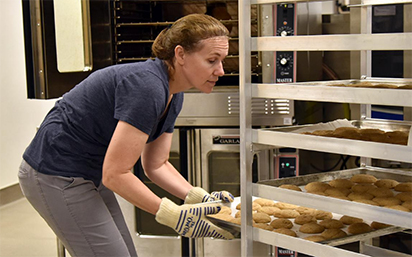
Cookie entrepreneurs find sweet success with K-State Olathe
Christina’s Cookie Co., a Louisburg, Kansas-based cookie startup, is adding Kansas State University’s Olathe campus to its list of ingredients.
The cookie company is using kitchen space and industry-grade cooking appliances and equipment at K-State Olathe to grow their business. Recently, they used the venue for a week to bake and package 4,000 cookies for Ciderfest, an annual fall event in Louisburg that draws around 25,000 visitors — presenting the company with its largest sales opportunity to date.
Christina’s Cookie Co. was started in June by Christina Lewis, a fourth-grade teacher at Broadmoor Elementary School in Louisburg. Lewis operates the business in her spare time with her daughter, Hannah.
Currently, the company sells cookies through its online storefront, every other weekend at the Olathe Farmer's Market and at charity events. Lewis hopes to scale up the business enough that she can eventually open a bakery and turn it over to Hannah.
“Right now, our baking can be done at home in my oven with a little planning,” Lewis said. “However, we want to start getting our name out there more by selling at larger events. My single kitchen oven just can’t handle baking hundreds or thousands of cookies in a short time to support this next step.”
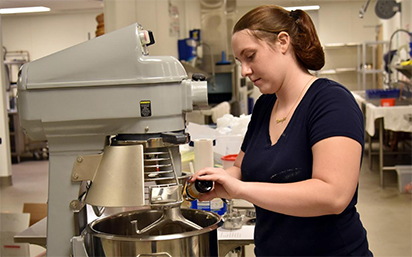 Knowing thousands of cookies would need to be made for Ciderfest, Lewis contacted Bryan
Severns ’10, ’14, food programs and services manager at K-State Olathe. Severns oversees
the campus’ Food Innovation Accelerator, which supports food-based businesses by helping
them test and refine recipes, scale up operations and more. Thanks to K-State, Christina’s
Cookie Co. now had the space and equipment it needed.
Knowing thousands of cookies would need to be made for Ciderfest, Lewis contacted Bryan
Severns ’10, ’14, food programs and services manager at K-State Olathe. Severns oversees
the campus’ Food Innovation Accelerator, which supports food-based businesses by helping
them test and refine recipes, scale up operations and more. Thanks to K-State, Christina’s
Cookie Co. now had the space and equipment it needed.
To prepare for Ciderfest, Lewis enlisted the help of her husband, Joe; daughters, Hannah and Maddie; and her mother, Beth.
In the week before Ciderfest, the family spent 3-4 hours every weeknight after work and school preparing cookies for the event. Ingredients were mixed; cookies were baked — nearly 900 every evening; baked cookies were packaged and then boxed; and the boxed, ready-to-be-sold cookies were loaded into a walk-in freezer for the weekend festival.
Most of the recipes are family ones that have been passed from one generation to the next.
“I come from a line of bakers and baking has always been something I’ve loved to do,” Lewis said. “As a little girl, I used to bake cookies and cakes with my Easy-Bake Oven. So, doing this on a bigger scale has always been a dream of mine. I’m really excited for more people to start tasting the cookie recipes I grew up enjoying and the same ones I’ve made for my family.”
Learn more about Christina’s Cookie Co., or discover more about how K-State Olathe’s Food Innovation Accelerator helps businesses grow and succeed.
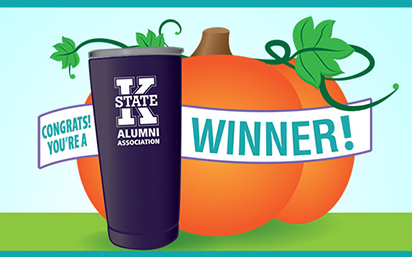
Congrats to the winners of our tumbler giveaway on the K-State Alumni Link for Life app!
Thank you to everyone who downloaded our K-State Alumni Link for Life app and entered to win a purple K-State Alumni Association tumbler, and congratulations to our 24 winners!
-
Casandra (Robinson) Peters ’11
-
Mindi Adler ’03
-
Carolyn Aeschliman ’91
-
Taylor Anderson
-
Tracy Appleba
-
Craig Augustine ’01
-
Jill Aurand ’90, ’91
-
Ray Bartholomew ’77
-
Julie Benson ’97, ’99
-
Miranda Boatwright
-
Mary Burgett ’86
-
Becky Carney ’86
-
Ashley Garrett ’99
-
Greg Graff ’73
-
Stephanie Heger ’92
-
Collin Huerter ’14
-
Scott LaMunyon ’17
-
Penny Mellies ’85
-
Julia Oetting ’11
-
Mike Sanderson ’81
-
Kimberly Shirley ’97
-
Robert Simmons ’85
-
Emily Stoltz ’09
-
Emily Vogel ’10
“This made my day,” said tumbler winner Mary Burgett. “I am thrilled and KSU proud. I teach family and consumer sciences at Santa Fe Trail High School and will use this proudly, giving it everyday exposure to our staff and students.”
If you don’t have the K-State Alumni Link for Life app yet, be sure to download it today so you can stay up-to-date on K-State Alumni Association news and announcements. Also be sure to watch for other giveaway opportunities in the future!

Foundation news: $1 million gift from Mary Vanier launches the K-State Family Scholarship Program
Mary Vanier ’89, Manhattan, Kansas, has given a gift of $1 million to Kansas State University to create at least 30 matching gift scholarships as part of the K-State Family Scholarship Program. This program is an initiative of the KSU Foundation to increase scholarship dollars to help K-State attract and retain students and to inspire new donors to invest in student success.
The Mary L. Vanier K-State Family Scholarship will be used to match at least 30 new gifts for scholarships. New gifts of $30,000 will be matched with $30,000 from Vanier’s gift, and $10,000 will go into an expendable scholarship fund, making $2,000 scholarships immediately available to students. The remaining $50,000 will go into the endowment, ensuring future generations of Wildcats will receive scholarships as well. This program widens the philanthropic support base for K-State by inspiring new donors to give while creating scholarships necessary to help students attend K-State today and in the future.
“I hope this inspires those who have thought about setting up a scholarship but haven’t because they couldn’t meet the minimum endowment requirement,” Vanier said. “It’s going to take all of us to support K-State, and this program offers a wonderful way to get involved. With this match program, our newest donors can make a significant impact on students right away.”
Land-grant legacy: How K-State fulfills this important mission with the help of philanthropy
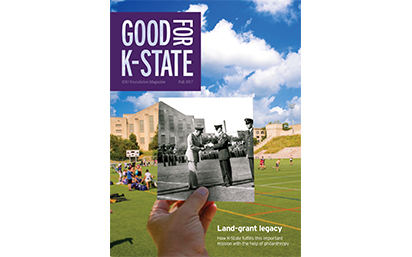 Every Kansan is touched in some way by the work of Kansas State University. As the
state’s land-grant university, K-State’s mission is to make education accessible,
disseminate information to the wider population and engage in community life. There
are hundreds of programs at K-State that benefit Kansas communities and give students
hands-on experience working on real issues.
Every Kansan is touched in some way by the work of Kansas State University. As the
state’s land-grant university, K-State’s mission is to make education accessible,
disseminate information to the wider population and engage in community life. There
are hundreds of programs at K-State that benefit Kansas communities and give students
hands-on experience working on real issues.
In this issue of Good for K-State, you will learn about just a few of the various programs at K-State that fulfill the land-grant mission. Private gifts from K-Staters like you, stewarded by the KSU Foundation, are instrumental in keeping this work going.
In this issue
- Stay tuned for bowl announcement and travel details
- Photo gallery: K-State community celebrates family and spirit of unity with KSUnite event
- K-State wins national Innovation Award from the Association for Public and Land-grant Universities
- ’Tis the season for purple pride: Holiday gifts for K-Staters
- Gift of growth: Alumni and friends invited to help with K-State tree planting project
- You’re invited to join us for a Wabash CannonBall event in 2018
- Cookie entrepreneurs find sweet success with K-State Olathe
- Congrats to the winners of our tumbler giveaway on the K-State Alumni Link for Life app!
- Foundation news: $1 million gift from Mary Vanier launches the K-State Family Scholarship Program
College News
College of Agriculture
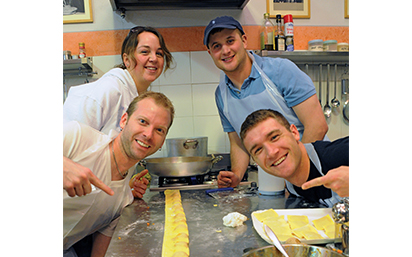
International study tours enhance on-campus experience
Students in the College of Agriculture are encouraged to include an international study experience as part of their K-State education. Study-abroad tours immerse students into new cultures, customs, and ways of thinking and doing business.
In January, an 11-day agricultural economics study tour will introduce students to the agricultural industry of India, including livestock and crop production and management practices, food markets, agribusiness, government operations, as well as other historical and cultural educational opportunities.
“International travel and study provides an enormous opportunity to learn about people different from yourself,” said Andrew Barkley, professor of agricultural economics who is leading the India tour with Mary Ellen Barkley ’00 of the Career Center. “Participants learn about themselves, how to work with others, how to be diplomatic and how to become a better citizen of the world.”
Tours scheduled for spring:
Ecuador — March 15-25, 2018
Contact: Kraig Roozeboom ’06 or Nathan Nelson ’98
Highlights: Tours of Otavalo fruit and animal market and Guayaquil City; production of corn and potatoes, tropical fruits, specialty crops, plantation crops and native grains.
Italy — May 14-27, 2018
Contact: Valentina Trinetta
Highlights: Production of local food products and traditions of Central-South Italy with particular emphasis on quality and safety; harvesting of plant and animal products, the processing and use of those products in traditional foods; and why Italians place such a high emphasis on their food.
Tokyo/Kyoto, Japan — May 15-25, 2018
Contact: John Gonzalez
Highlights: A mix of agricultural and cultural visits to include the Kikkoman soy sauce factory, tea and rice plantations, temples and riding the bullet train.
Czech Republic — May 19-31, 2018
The tour will introduce students to the agricultural industry in the Czech Republic, including production, management and processing practices. Highlights: Prague Castle, Kromeriz Research Institute visit, tour Lukrom, cooperative farm visit and a Pilsen Urquell Brewery visit.
Purpan Summer Study Abroad Program — May 28-June 22, June 22-July 20 (optional internship)
Contact: Don Boggs ’77
The Ecole Superieure D’Ingénieurs–Purpan offers a four-week or an eight-week summer program with four weeks of courses, followed by an optional four-week internship/homestay. Students have the option to select a specialized study of French and EU Agriculture in either the agricultural and food option or viticulture/oenology option. El Purpan is located in Toulouse, France’s most important agricultural region.
To receive credit for tours, students complete reading assignments, attend lectures, and become acquainted with the culture and history of the countries before the trip and often make oral or poster presentations afterwards.
Students are eligible for financial assistance from the College of Agriculture. In addition, students are eligible for scholarships from the Office of International Programs and for financial aid to help with trip expenses.
Photo: Food science and industry students making pasta in Florence, Italy, during a 2015 study-abroad tour. (Courtesy photo)
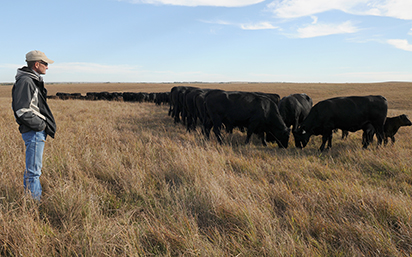
December meetings review cattle production on limited pastures
Beef specialists are hosting meetings in Kansas and Nebraska to help cattle producers maintain their herds on limited perennial pastures. Topics include confined cow feeding, using corn residue, cover crops and annual forage systems.
“Agricultural land usage in the Central Plains region has been changing over the past decade and as such cattle producers need to be inventive about management practices so that they can maintain cattle numbers for their livelihood,” said Jaymelynn Farney ’07, ’12, beef systems specialist with K-State Research and Extension. “Perennial pastures are one of the diminishing resources for cattle operations as often these pasture lands are being converted into cropland or used in urban living.”
To address these issues, three meetings are scheduled:
-
Dec. 12, 6:30 p.m. at the Helvering Center in Marysville, Kansas (111 S. 8th Street). RSVP to Anastasia Johnson, anastasia@ksu.edu.
-
Dec. 13, 6:30 p.m. at the Blue Hill Community Center in Blue Hill, Nebraska (555 W. Gage Street). RSVP to Brad Schick, brad.schick@unl.edu or 402-746-3417.
-
Dec. 14, 6:30 p.m. at the Gateway Civic Center in Oberlin, Kansas (1 Morgan Drive). RSVP to Alyssa Rippe ’13, alyssar@ksu.edu or 785-475-8121.
There is no cost to attend, but interested persons are asked to RSVP to the appropriate contact by Dec. 8 so organizers can provide an accurate meal count.
The speakers for each meeting include:
-
Mary Drewnoski, beef specialist with the University of Nebraska-Lincoln, “Thinking outside the box: economical forage options for the area.”
-
Jaymelynn Farney, beef systems specialist with Kansas State University, “The do’s and don’ts of cover crop (annual forages) grazing from a livestock perspective.”
-
Karla Jenkins, cow-calf specialist with the University of Nebraska-Lincoln, “Confinement cow feeding – the science and the art.”
Drewnoski is part of an interdisciplinary team evaluating economical systems for integrated crop and livestock production in Nebraska.
Farney is working on research and outreach for practical cattle management. Her main emphasis includes cover crop/annual forage usage, supplementation for growing cattle and cow-calf management.
Jenkins’ research includes finding more efficient and economical ways to produce beef cattle while sustaining the range resource. She also evaluates annual forage crops and alternative uses for crops such as field peas or sugar beets as components in beef cattle diets to improve sustainability and efficiency of cattle operations in western Nebraska.
The overarching content at each meeting will be the same, but management adaptations will focus on the region near the meeting location.
College of Architecture, Planning and Design
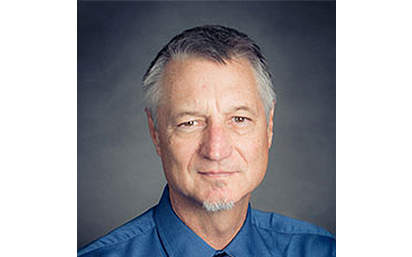
APDesign professor Condia selected as Regnier distinguished faculty chair
Kansas State University College of Architecture, Planning and Design professor Bob Condia, member of the American Institute of Architects, was selected as the Victor L. Regnier distinguished faculty chair in the architecture department.
Condia is an architect and design partner with Condia+Ornelas Architects, Manhattan, Kansas. He teaches architecture as an art form with a wide variety of considerations from neuroscience to a building’s terrestrial and celestial alignments and metaphysics and poetics of architectural design.
Condia has been a studio critic for 30 years in both architecture and interior design. In 2008 he received the Commerce Bank Distinguished Undergraduate Teaching Award; in 2015 he received AIAKansas’ Schirmer Award for service. His publications range from monographs on the works of progressive architects to theoretical articles on the experience of space as well as a catalogue of his own surrealist illustrations. His recent works include topics on neuroscience and architecture, the biological basis of aesthetic experience and the craft of teaching architects to teach.
Condia earned his master’s in architecture and building design at Columbia University in 1983, and a Bachelor of Architecture at California Polytechnic State University in 1980.
“As I visit alumni far and wide, professor Condia is consistently cited as the ‘difference maker’ — that faculty member who instilled the greatest sense of joy, passion and responsibility in them during their time in the program,” said Tim de Noble, professor and dean, College of Architecture, Planning and Design. “It is fitting that he has been selected as the Regnier distinguished faculty chair.”
“This is a well-deserved honor for professor Condia,” said Matthew Knox ’87, architecture department head. “His respect as a teacher of all things architecture is a major part of our program’s success. His zest to understand the experience of architecture through neuroscience is an important avenue of research. I am particularly pleased that the chair will foster this work while creating rich opportunities for student involvement.”
The Victor L. Regnier chair in architecture was established in 2002 by the children of Victor L. and Helen Regnier to enrich the educational experience of K-State architecture students and to perpetuate the memory of Victor L. Regnier. It is designed to recognize and retain the highest quality faculty in the department of architecture.
College of Arts and Sciences
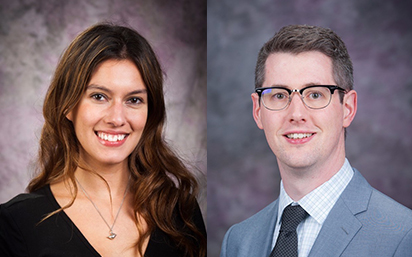
Political science researchers receive $1.2 million grant to study effects of U.S. military’s overseas presence
The United States has maintained a large overseas military presence since World War II. The strategic advantages of such installations may be clear, but how troop deployments affect host nations is not.
Two Kansas State University political science researchers have been awarded $1.2 million by the U.S. Department of Defense Minerva Research Initiative to study the political, economic and social effects of the United States’ overseas military presence. Carla Martinez Machain, associate professor, and Michael Flynn, assistant professor, will work with a team to engage in a large data collection effort to explore public attitudes and beliefs about American activities and installations abroad at the national, regional and local levels.
Both Martinez Machain and Flynn have longstanding interest in international conflict and security, with a specific interest in military deployments.
“As a country, we’ve been maintaining some of these deployments for more than 70 years now,” Flynn said. “After such a long time, we’ve formed deep relationships with some of these countries through our military presence, but there’s still a lot we don’t know about those relationships and what kinds of effects these deployments have on the host country.”
Martinez Machain said current data are inadequate.
“We were asking questions about effects of U.S. troops on the host states’ foreign policies, human rights, development and so on — but all at the national level,” Martinez Machain said.
Collecting detailed data through public opinion surveys, interviews and other methods will help researchers address several questions. One is how the United States’ troop presence and overseas military expenditures affect local economies. Another is how many crimes are committed by or against U.S. military personnel, civilian employees and contractors, and how tensions affect attitudes toward the U.S.
Documenting protests against American forces is another part of the project. Martinez Machain said protest motives or objectives are not always as they seem, so she and Flynn will try to uncover “fine-grained causes and effects.”
“We will look at protests to deployments, and geocode them — document the location of the protests, how many people are involved and the grievance,” Martinez Machain said. “We might assume it’s about the troops, but sometimes it’s not. For instance, Italians would protest at U.S. installations in Italy, but the protests were really about domestic issues. They knew the media would cover it if the protest was outside the military installation.”
The U.S. Department of Defense is keen to understand these issues, too, which is why it supports basic social science research through the Minerva Research Initiative. Minerva funds relevant research that speaks to current or near-term challenges the military is confronting. Flynn said the data will be available for public consumption when the three-year study is complete.
“The funding comes from the Office of Basic Research at the Department of Defense,” he said. “The investment goes beyond K-State and what our team produces. We are hoping this is something other people will be using after this program window closes.”
In addition to providing vital data to researchers interested in international security and U.S. military policy, Flynn said the grant will help involve students in research by supporting a graduate student and offering opportunities for undergraduates to participate.
“K-State is doing important work, and we are able to give students a research experience here they may not get at other institutions,” Flynn said.
Jeff Pickering, head of the political science department, added that Martinez Machain and Flynn benefited from a trip to Washington, D.C., earlier this year for early career faculty. The trip, which was led by the K-State Office of Research and Sponsored Programs, provided the researchers an opportunity to meet with the Minerva program director at the Pentagon.
“K-State’s trip to visit funding agencies was very beneficial for Drs. Flynn and Martinez Machain,” Pickering said. “It helped them to fine-tune their project, and the resulting Minerva grant will provide data and research that will be important for scholars and policymakers alike.”
Co-investigators for the grant are Michael Allen, associate professor of political science at Boise State University, and Andrew Stravers, doctoral candidate in political science at the University of Texas, Austin.
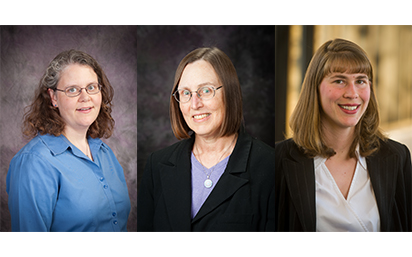
Three K-State teams awarded more than $2.5 million by National Science Foundation for research instrumentation
Teams led by three Kansas State University researchers have been awarded National Science Foundation Major Research Instrumentation grants. The grants will provide more than $2.5 million to advance understanding of lipids, agriculturally significant gases and nanoparticles, as well as student training and regional research capacity.
Universities are allowed to submit only three proposals each year to the NSF MRI program, and having all three proposals funded is relatively rare. Out of 154 organizations competing this year, K-State was one of only five universities to receive three awards. Beth Montelone, senior associate vice president for research, said the university’s proposals likely were successful because the projects demonstrate benefits to more than one field.
“I think one of the reasons that all three were funded is that they’re all collaborative, interdisciplinary efforts with involvement from investigators from multiple departments and projects,” Montelone said.
Award 1
The largest of the three awards, $1.69 million, will support the development of a new instrument that is the result of a groundbreaking collaboration between physics and agronomy. The project is led by Kristan Corwin, Ernest K. and Lillian E. Chapin professor of physics and interim associate dean for research in the College of Arts and Sciences. Corwin and her co-investigators — Stephen Welch, professor of agronomy; Eduardo Santos, assistant professor of agronomy; and Brian Washburn, associate professor of physics — will work to adapt a Nobel Prize-winning technology that precisely measures optical frequencies. The optical-frequency comb allows such exact measurements that it can help researchers tell one molecule from another. Corwin’s team will work to adapt dual-comb spectroscopy to characterize interactions between soil, plants and atmosphere in crops. Ultimately, they hope the instrument will help agronomists improve crop genetics and feed the world’s growing population.
Corwin said the goal is to obtain real-time information about how plants are using resources.
“If we want to understand the effects of fertilizer and water on plants and how these interact with plant genetics to produce the best crop characteristics, we have to be able to measure as much as we can about them,” she said.
Corwin is excited at the prospect of advancing laser physics while learning more about agronomy. She said a K-State strategic investment in this collaborative effort several years ago helped lay the groundwork for this project.
“We had to build a common language and recognize areas of common understanding and where the same word means something different,” she said.
Award 2
A second award of $496,823 will help researchers enhance food, industrial and energy crops by advancing understanding of lipids, compounds that help plants store energy and conduct other vital biological processes. The Kansas Lipidomics Research Center will purchase a new, powerful mass spectrometer that will improve the speed and specificity of its analyses. The instrument maker is awarding another $50,000 through the SCIEX Academic Partnership program to help maintain the new instrument.
Ruth Welti, university distinguished professor of biology and director of the center, said her team is working to identify and characterize the functions of genes associated with desirable traits in plants, such as cold and heat tolerance. Now that many plant genomic sequences are available, researchers can identify alleles of specific genes associated with desirable traits. Studying lipids helps to characterize the molecular basis of the traits.
“By measuring lipids, we can correlate genetic and physiological traits with metabolic traits and biochemical pathways,” Welti said. “We can determine the biochemical mechanisms of field traits and the underlying genetics.”
Welti’s co-principal investigators are Geoffrey Morris, assistant professor of agronomy; Krishna Jagadish, associate professor of agronomy; Kathrin Schrick, associate professor of biology; and Timothy Durrett, assistant professor of biochemistry and molecular biophysics. The team will develop rapid, specific methods for analysis of plant metabolites.
“Analytical systems are available to measure lipids and other metabolites important in human health, but there is no plug-and-play analytical system for plant lipids,” Welti said. “Thus, as part of our work, we’ll develop a lipid analytical system that can be adopted in other labs.”
Award 3
The third award of $350,000 will support acquisition of a graphic processing unit, or GPU, enabled computer cluster. Christine Aikens, professor of chemistry, is the principal investigator. Aikens and her team will use the GPU-enabled cluster to enhance efforts to gain atomic-level insights into chemical mechanisms and biological interactions of nanoparticles and biomolecular simulations in general. The new cluster will be housed in Beocat, K-State’s research computing cluster, and will be available to other researchers at the university and other colleges and universities in Kansas.
Aikens’ co-principal investigators are Bin Liu, assistant professor of chemical engineering; Paul Smith, professor of chemistry; Jeffrey Comer, assistant professor of anatomy and physiology; and Daniel Andresen, professor of computer science and director of Beocat. Jeremy Schmit, associate professor of physics, is a senior investigator on the proposal. Projects will include modeling nanomaterials in an effort to understand light harvesting systems, how nanoparticles behave in the body and more. Aikens said the group’s work to find underlying principles is filling gaps in the field.
“It’s a puzzle we need to try to solve,” Aikens said. “We are exploring where no one has gone before — there’s always something new and interesting.”
The high-memory nodes in the new cluster will help Aikens complete calculations that aren’t possible with the current system; for instance, her team will be able to model nanoparticles that contain a few thousand atoms rather than a few hundred.
“Bigger and faster is always great when you talk computing,” Aikens said. “This is definitely a big step for K-State computing.”
Montelone said she is happy to see the university build on past success with the NSF MRI program. The university has received a total of 18 MRI awards since the program’s inception and previously had two proposals in one year funded in 1999, 2005 and 2012. She’s optimistic about future years.
“We have a good process,” Montelone said. “We’re getting information out to more investigators, and because we have a pre-proposal competition, we’re choosing the best proposals. Our faculty are stepping up and writing really strong proposals.”
College of Business Administration
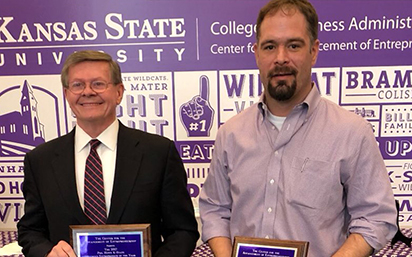
K-State Entrepreneurship Day showcases student and community entrepreneurial talent
Student innovation and community support were on display during K-State Entrepreneurship Day in the Kansas State University Center for the Advancement of Entrepreneurship.
The day featured a variety of events including the announcement of several awards and scholarships, a keynote speech, and the finals of the K-State Launch student entrepreneurial idea competition.
As part of the festivities, the center partnered with the K-State Alumni Association and the Manhattan Area Chamber of Commerce to select and honor both an alumnus and a local community member for their outstanding entrepreneurial spirit, innovation, personal integrity, strategic direction, market impact and social responsibility. The Phil Howe Alumnus Entrepreneur of the Year Award was presented to Kevin Smith ’70, partner and strategic adviser with KMG Capital Partners in Denver, Colorado, while the John R. Graham Community Entrepreneur of the Year Award went to Sean Ruth, president and founder of Redi Systems.
Also announced was the fall 2017 recipient of the Butler Family Scholarship in Entrepreneurship, Natalie May, sophomore in Entrepreneurship, Peck, Kansas, who will receive $2,500 each semester.
The keynote speech was presented by Scott Redler, co-founder and chief operating officer of Freddy’s Frozen Custard and Steakburgers, as part of the fall Entrepreneurship Speaker Series, which brings successful entrepreneurs into the classroom to share their stories.
Wrapping up the day’s events were the finals of K-State Launch, an entrepreneurial idea competition open to students from all majors. After narrowing the field down to 10 finalists through preliminary judging, each student had the opportunity to deliver a business pitch to a panel of judges that consisted of local entrepreneurs, bankers and investment experts which had $6,000 in prize money to distribute to the companies they felt showed the most promise. In the end, six businesses were awarded cash prizes by the judges’ panel.
Austin Chauncey, senior in mathematics and computer science, Manhattan, Kansas, and Melanie Wertzberger, junior in finance, Hiawatha, Kansas, were awarded $2,000 for their pitch for AdviseMe, an academic advising and degree auditing SAAS platform, allowing students and their advisers to work proactively on their personalized degree completion plan.
The next award of $1,500 went to Laura Rozell ’15, graduate student in hospitality and dietetics, and Sam Rozell, senior in electrical engineering, both of Manhattan. Their pitch was for Ido Watch, a wrist-worn galvanic-skin-response sensor with wireless connectivity and an accompanying iPad app.
The third-place award of $1,000 went to Chelsea Werdel, sophomore in business, Manhattan, for Genie in a Bottle Salon Management Consulting Firm. She plans to advise salon and spa businesses, stylists, and barbers in the following areas: organizational design, human resources, corporate strategy, information technology strategy, marketing and sales, social media, finances, and logistics.
Rounding out the prizes were three honorable mention awards of $500. They went to: the Bison Agrotech team of Nelson Ramello, doctoral student in physics, Cordoba, Argentina, and Herman Coceancigh, doctoral student in chemistry, Buenos Aires, Argentina; the Chakula Utoaji team of Garrett Wilkinson, senior in nutritional sciences, Hutchinson, Kansas, and Nick Bouzianis, junior in nutritional sciences, Topeka, Kansas; and Abdullah Choudhry, senior in mechanical engineering, Gujranwala, Pakistan, for his pitch of Vented and Vetted Solutions.
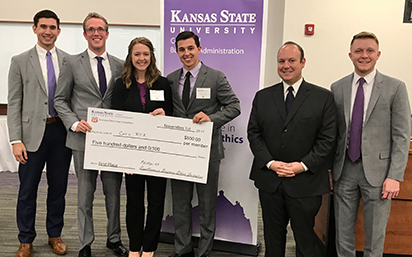
Phillips 66 Business Ethics Case Competition awards more than $4,000 to K-State students
The Kansas State University College of Business Administration recently awarded more than $4,000 in scholarships to 17 students as a result of the 2017 Phillips 66 Business Ethics Case Competition.
A total of 277 students representing 80 teams entered the competition, which was organized by the college’s Ethics and Responsible Business Citizenship Initiative and sponsored by Phillips 66.
Students were challenged to examine a real-world ethical dilemma in the pharmaceutical industry and were responsible for analyzing the situation, applying appropriate ethical and strategic management principles, and developing a viable set of practical recommendations. After a contingent of faculty in the management department evaluated the initial written analyses, five teams were selected to compete in the final round where they presented their analysis and recommendations to a panel of judges.
“Participating in this competition allows our students to showcase what they have learned at K-State while developing their analytical, decision-making and presentation skills,” said Bill Turnley, Sam and Karen Forrer chair of business ethics and head of the management department. “We appreciate all that Phillips 66 and our faculty did to make this important developmental event a possibility.”
The winners of the competition were Zachary Case, senior in finance and accounting, Olathe, Kansas; Renee Dick, senior in finance and accounting, Wichita, Kansas; and Tevin Grace, senior in accounting, Salina, Kansas. Each member of the winning team received $500.
The second-place team was comprised of Tom McCue, senior in finance, Olathe; Bailey Raynolds, senior in management, Tonganoxie, Kansas; Ben Tjiang, senior in management information systems, Olathe; and Jessica Wilkus, senior in management with a minor in leadership studies, Wichita. Each member of this team earned $300.
Taking home third place and $200 each was the team of Eli Camp, senior in accounting and finance, Winfield, Kansas; Jake May, senior in marketing, Goddard, Kansas; Carlos Ruiz, senior in management, Kansas City, Kansas; and Drew Schrum, senior in finance with a minor in economics, Norton, Kansas.
Those on the remaining two teams received an honorable mention award of $100 for advancing through the first two rounds of the competition and making it to the finals. Those receiving the honorable mention designation include: Thomas Bremser, senior in finance with a minor in economics, Lansing, Kansas; Dre Faison, senior in management with a minor in leadership studies, Kansas City; Olivia Harding, senior in marketing with a minor in leadership studies, Shawnee, Kansas; Bre Lombard, senior in marketing with a minor in leadership studies, Northwood, Iowa; Leah Loredo, senior in marketing and modern languages, Wakefield, Kansas; and Nicole Reisert, senior in accounting with a minor in Spanish, Danbury, Connecticut.
College of Education

College of Education faculty invited to present at Harvard
Two College of Education faculty members were invited to present about K-State’s digitally mediated field-based supervision program at Harvard's Graduate School of Education. The purpose of the convening was to bring together experts in the field of using video as a tool for mentoring pre-service and in-service teachers.
David S. Allen, associate professor of curriculum and instruction and director of field placements, and Jill Wood, block C instructor/coordinator in the Department of Curriculum and Instruction, co-presented at the working group on video use in teacher development at Harvard’s Center for Educational Policy Research. The title of their presentation was “Elements of Feedback.”
“We learned a great deal about the way other institutions crafted their programs, and we learned that no one in attendance had a group as large — we have 600 students who use SWIVL robots and iPads — in terms of a comprehensive program,” Allen said. “They were impressed with our level of success utilizing this system with so many students.”
Allen and Wood will share their insights with their curriculum and instruction colleagues, where they will discuss ideas they discovered at the convening and hope to enact practices that will further enhance K-State’s program.
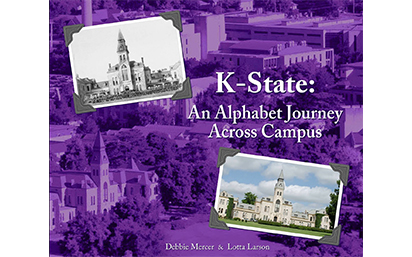
Journey for the perfect gift stops here: ‘An Alphabet Journey Across Campus’ book
Looking for the perfect graduation or holiday gift for the purple person in your life? How about a book about K-State authored by K-Staters?
An Alphabet Journey Across Campus is a delightful publication penned by Debbie Mercer ’84, ’88, ’96, ’99, dean of the College of Education, and Lotta Larson ’92, ’99, ’03, ’07, associate professor of curriculum and instruction. The alphabet-inspired poems offer spirited glimpses into what it means to be a K-Stater, such as:
“P stands for purple
The respected color we bleed,
The only official K-State color
Kansas State will ever need.”
The books are $20 and can be purchased by emailing Pam Monroe ’77 at pmonroe@ksu.edu. All profits support scholarships for students in the College of Education.
College of Engineering
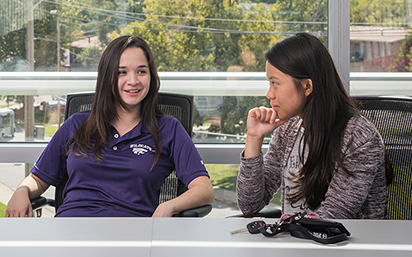
Computer science students win at Kansas City Startup Weekend
Team Zoobot, led by two Kansas State University computer science students, took first-place honors at Kansas City Startup Weekend 2017, in Kansas City, Missouri.
Open to those with entrepreneurial drive, the weekend is a 48-hour event for developers, designers and entrepreneurially-minded people to gather and create a startup.
Alice Lam, junior, Wichita, Kansas, and Fernanda De La Torre, senior, Kansas City, Missouri, working from a 2017 All-University Open House project — the autonomous assistive quadcopter — competed with the winning idea for a series of programmable smart toys that children can modify physically and, by changing the software, learn about artificial intelligence.
Lam and De La Torre are both research programmers in the Laboratory for Knowledge Discovery in Databases, directed by William Hsu, professor of computer science, who also served as faculty adviser for the original Open House team. That team included four other computer science majors and Octavio Sosa, an entrepreneur from Kansas City, who helped originate the team with De La Torre when the two had participated in undergraduate research projects at the University of Missouri during summer 2016.
In the initial qualifying round, De La Torre, Lam and Sosa pitched their idea for the toys and received enough votes from participants to proceed. Approximately half of the teams pitching make it to the competition round, where students from other universities are added as team members for the rest of the event.
With four new members, team Zoobot then developed a business case and marketing plan, and demonstrated a prototype, focusing on the artificial intelligence and object-recognition capabilities of the toys. The team was awarded first place by the event judges and also won the People’s Choice award, voted on by attendees.
Teams were provided with resources via facilitators and mentor teams who bring expertise from various industries in the Kansas City community to work with the students. Local sponsors included the Enterprise Center in Johnson County, Eyeverify, the Kauffman Foundation, Briteworks and Venture Legal. The event is led by volunteer community leaders.
Lam is a scholar of the Kansas Louis Stokes Alliance for Minority Participation, a National Science Foundation program supporting minorities in science, technology, engineering and mathematics programs, and preparing interested students for graduate study.
De La Torre, a student in the Kansas State University Honors Program, is also a member of the Developing Scholars Program, which offers high-achieving, serious-minded students research projects in their field of study with faculty mentors. Scholars receive academic, social and financial support while becoming integrated into the intellectual climate of the university.
Hsu, who was a visitor to Kansas City Startup Weekend and served as an unofficial adviser to team Zoobot, was invited by event organizers to be a tech mentor for the regional startup consortium.
K-State’s computer science department is part of the College of Engineering.
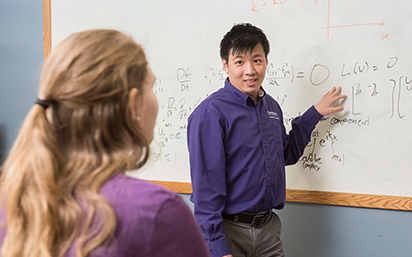
NSF grant to support engineering professors’ development of triboelectric nanogenerators
The triboelectric effect, a phenomenon where a material becomes electrically charged after it contacts a different material through friction, has been understood since ancient times. Today, two Kansas State University engineers are seeking a way to harvest the energy from this effect when produced by mechanical contact between dissimilar surfaces.
With the world’s increasing demand for energy, harvesting of this buildup of electrical charge may hold an opportunity for generation of electricity.
Using computational techniques with supercomputers, James Chen, assistant professor of mechanical and nuclear engineering and lead investigator, and Zayd Leseman, associate professor of mechanical and nuclear engineering, will undertake a project to provide a theoretical framework for engineering triboelectric nanogenerators capable of harvesting significant amounts of this power in a controlled way.
The professors have been awarded a three-year, $400,000 National Science Foundation award from the foundation’s Mechanics of Materials and Structures Program for their work.
“Harvesting of energy inherent in everyday life is central to this research and very important for the U.S. economy and society,” Chen said. “Our work will involve many disciplines, including contact mechanics, solid mechanics, materials science, electrical engineering and manufacturing.”
Chen and Leseman will perform simulations in conjunction with carefully designed experiments to derive an atomistic electrodynamic theory and integrate it into the simulations. They will investigate the charging mechanism of contact-mode triboelectrification, relating this with shear strain, surface roughness, friction cycles and harvesting efficiency.
“Outcomes of this project will not only unmask lurking mysteries of the triboelectric phenomenon,” Chen said, “but provide a platform for students — middle schoolers to college — to understand energy harvesting.”
The project will bolster three centers in the College of Engineering — the SMART Lab, Kansas State Microanalysis Lab and Beocat — while enhancing the research program of the mechanical and nuclear engineering department. It also will directly impact the 2025 initiative and its goal of K-State being recognized as a top 50 public research university.
College of Human Ecology
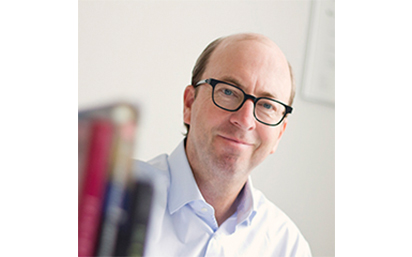
Hospitality management department names Ottenbacher new department head
Following a national search, Michael Ottenbacher has been named department head of the hospitality management department and will be a Mary L. Vanier Endowed Professor. Ottenbacher will join Kansas State University from Heilbronn University in Heilbronn, Germany, where he is a tenured professor in hospitality management and marketing.
“When I visited K-State, I was impressed by talented faculty and friendly and motivated students,” Ottenbacher said. “Prior to coming, I knew that K-State had an excellent hospitality management department.”
For the last eight years, Ottenbacher has taught strategic management, hospitality marketing, restaurant management, innovation management and entrepreneurship, lodging management, and introduction to hospitality and tourism management. Ottenbacher has taught at San Diego State University in San Diego, California; University of Guelph in Guelph, Canada; University of Surrey in Guildford, United Kingdom; and the University of Otago in Dunedin, New Zealand. His international exposure includes visiting professor engagements in Switzerland, Malaysia, Indonesia, Vietnam and France.
“From every country, I learned something about education and the hospitality industry — experiences I can pass on to students and faculty,” Ottenbacher said.
“With Dr. Ottenbacher’s international experience, he will be able to offer our students a unique global perspective on the hospitality industry that can facilitate travel and study abroad opportunities to foster their own transformational experiences,” said John Buckwalter, dean of the College of Human Ecology. “We are excited to have Dr. Ottenbacher in the college to help grow the capacity of the hospitality management department.”
Before his life in academia, Ottenbacher had a wide and varied experience across Europe and the United States. He has served as a food and beverage manager and then a general manager for a four-star hotel in Germany, trained in management at the Royal Sonesta Hotel in New Orleans, trained in front of the house operations at the exclusive Ritz Hotel in Paris and has held both management and staff positions in an assortment of hotels and restaurants in Germany and England.
After earning both bachelor’s and master’s degrees in hospitality management from Florida International University in Miami, Florida, Ottenbacher earned a doctorate from the University of Otago in Dunedin, New Zealand. His continuing research includes discovering innovation in hotels and restaurants, consumer behavior in restaurants, culinary tourism, and strategic management in the hospitality industry. Currently, he investigates satisfaction and loyalty behaviors of visitors of the Munich Oktoberfest and crowdfunding in the German restaurant sector.
K-State’s hospitality management department, part of the College of Human Ecology, is ranked among the top 20 best hospitality programs in the U.S. The program offers both graduate and undergraduate degrees in hospitality management and is accredited by the Accreditation Commission for Programs in Hospitality Management.
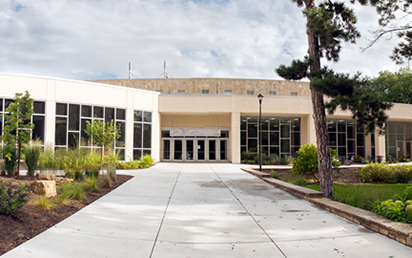
College of Human Ecology celebrates annual award winners
The College of Human Ecology welcomed six alumni and friends to campus for the annual Celebration of Excellence awards ceremony on Oct. 19 in Justin Hall. Each year, the college faculty and staff nominate alumni and friends of their programs for these prestigious college awards. The following are 2017 award winners:
Barbara Stoecker ’65, Distinguished Research Award
The Distinguished Research Award recognizes a human ecology graduate’s significant contributions to humanity, K-State and his or her profession through research. Stoecker is a Regents professor in nutritional sciences and Marilynn Thoma Chair in Human Environmental Sciences at Oklahoma State University. She was a third-generation K-Stater and the third to study in the College of Human Ecology. Following graduation from K-State, Stoecker has called many places home. Stoecker’s work on micronutrient requirements has allowed her to travel worldwide, from Jamaica to Thailand. After teaching at Texas Tech University, Stoecker and her husband, Art ’65, moved to Oklahoma State University to be closer to family. Stoecker earned her degree in home economics in 1965.
Josh Mathiasmeier ’11, ’12, Rising Professional Award
The Rising Professional Award recognizes significant professional contributions by a young graduate in the early stages of a career. Mathiasmeier currently serves as the director of nutritional services with Kansas Public Schools, USD 500. Currently, USD 500 serves around 32,000 meals per day to students. Mathiasmeier has used innovative techniques to expand the breakfast and afterschool meal programs. He also has increased the food quality and customer satisfaction. Under his direction, USD 500 has been able to offer meals free of charge to all elementary and middle school children. Mathiasmeier received his kinesiology and nutrition degrees in 2011 and his dietetics degree in 2012.
Greg Ward ’69, Executive Leadership Award
The Executive Leadership Award recognizes a human ecology graduate who provides leadership to a major business, association or institution and who has a sustained interest in the college. Ward came to K-State after attending the Culinary Institute of America and the University of Massachusetts Stockbridge. Ward’s restaurant career began with Gilbert-Robinson Restaurants in Kansas City, where he worked for 14 years. During his time with Gilbert-Robinson, Ward held positions like assistant manager of the Plaza III, general manager of Arrowhead Club at Arrowhead Stadium, general manager of Houlihan’s Old Place, area director of operations — Kansas City, and vice president of marketing and vice president of specialty restaurants. In 1983, Ward left Gilbert-Robinson and bought franchise rights to Wendy’s, which he built and runs in Pittsburg, Kansas. Ward received his bachelor’s degree in restaurant management in 1969.
Dana Weaver ’98, Public Advocacy Award
The Public Advocacy Award recognizes a graduate for their impact on issues important to the field of human ecology. Weaver is the chief operating officer of LeadingAge Kansas, an association of nearly 160 not-for-profit aging service providers dedicated to serving the needs of aging Kansans. She is responsible for operational oversight, new product development, organizational strategy and leadership to various teams. She has led her team to achieve a 94 percent overall satisfaction rate by members. Her passion lies with serving older people and she believes that she was put here to do so. Weaver earned a bachelor’s degree in business administration and gerontology with an emphasis in long-term care in 1998.
Meadowlark Hills, Friend of the College Award
The Friend of the College Award recognizes significant ongoing support of the work of the College of Human Ecology. The friend of the college must have demonstrated significant leadership on behalf of the college at the community, state or federal level. More than just a place, Meadowlark Hills is a not-for-profit organization devoted to caring for seniors in the Manhattan area. Meadowlark Hills provides senior-living services and wellness programs throughout the area, as well as a full spectrum of senior-living options at Meadowlark Hills, a continuing care retirement community. Meadowlark Hills has been a longtime partner and friend of K-State and the College of Human Ecology. Both organizations share a common goal of improving the quality of life for older Kansans and identifying and responding to the challenges and opportunities of an aging society.
Brett Bartholomew ’08, Entrepreneur Award
The Entrepreneur Award recognizes a human ecology graduate’s entrepreneurial spirit and success in business. Bartholomew is a strength and conditioning coach, author, consultant and founder of the performance coaching and consulting company, The Bridge Human Performance. His experience includes working with collegiate teams, professional fighters within the UFC and boxing, as well as several Fortune 500 businesses. Altogether, Bartholomew has coached a diverse range of athletes from across 23 sports at levels ranging from youth to Olympians and Super Bowl champions. His coaching and speaking has spanned the globe, from China to Brazil and numerous stops in between. His book, Conscious Coaching: The Art and Science of Building Buy-in, achieved bestseller status. Bartholomew received his bachelor’s degree in kinesiology in 2008.
For more information on each of the award winners, visit he.k-state.edu/alumni/awards.
College of Technology and Aviation
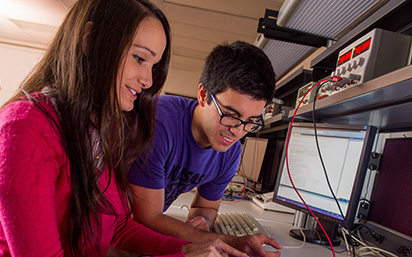
Kansas State Polytechnic adds technology education to bachelor’s degree offerings
Kansas State University Polytechnic Campus is expanding its degree options with a new offering for individuals interested in teaching technology at the high school level.
A Bachelor of Science in secondary education with a technology education endorsement is being launched at Kansas State Polytechnic in fall 2018. The degree option is a collaboration with the university’s College of Education and is designed to help address state and national needs for more science, technology, engineering and math, or STEM, educators. Enrolled students will study mechanical, electronic and computer systems curriculum through Kansas State Polytechnic’s engineering technology program while the education pedagogy will be supported by the College of Education.
“The mission of the Polytechnic Campus is to provide students with relevant, hands-on learning experiences that are easily transferable to various industries, and we believe technology education is an appropriate fit for our mission and that style of teaching,” said Verna Fitzsimmons, CEO and dean of Kansas State Polytechnic. “We also are proud to offer a degree option where students can study an in-demand career field that directly contributes to the solution of a national education and economic concern. Thank you to the College of Education for partnering with Kansas State Polytechnic to make this offering possible.”
Along with general education courses, the technology education degree option combines 67 credit hours of mechanical engineering technology, computer systems technology, and electronic and computer engineering technology courses with 35 hours of professional pedagogical courses. To fulfill the technology content requirements, students will learn from Kansas State Polytechnic professors about such topics as basic electronics, computing principles, hardware and software fundamentals, machine design and manufacturing methods. Many of the courses include lab time and project-based assignments, so students will have a better understanding of the material and can use hands-on demonstrations in their own classrooms.
The secondary education curriculum will be taught through video conferencing by professors from the College of Education with plans to hire faculty members on the Polytechnic Campus as the degree grows. Students also will get the opportunity to teach at a local high school for one semester and will earn their official licensure upon completion of the bachelor’s degree and passing of the state Praxis test.
“The College of Education produces more teachers than any of the other 24 teacher training programs in Kansas and we are excited to work with the Polytechnic Campus to expand upon those numbers in this new licensure area,” said F. Todd Goodson, chair of the curriculum and instruction department at K-State. “It is difficult to overstate the importance of technology today. We have a pressing need to produce more high school graduates with advanced technology skills to meet the demands of industry and higher education. I expect graduates of the technology education degree to find high schools eager to consider them for teaching positions.”
In the past several years, national initiatives and jobs reports have outlined the necessity for more STEM education. K-State’s College of Education is a partner in the 100Kin10 network, which was created in 2011 after former President Barack Obama issued a call to add 100,000 STEM teachers across the country over the next 10 years. The group includes more than 280 academic institutions, nonprofits, foundations, companies and government agencies in the United States that have committed to help lead the charge. Most recently, the Trump administration echoed this urgency by directing the Education Department in September to invest a minimum of $200 million annually in grant funding to further develop STEM and computer science education.
Alysia Starkey ’10, associate dean for undergraduate studies at Kansas State Polytechnic, says there are a variety of prospective students who would fit well in the technology education degree option. High school students with an interest in teaching or who excel in engineering technology classes such as manufacturing, construction, energy, power and technical design should consider enrolling. Also, transfer students and current teachers who want to change their endorsement are encouraged to apply.
“The Kansas Department of Education added technology education to its list of approved teaching endorsements because the department wanted to contribute to the state’s STEM education needs, but it only did so about two years ago,” Starkey said. “This means there are numerous current teachers out there who may already instruct a few technology classes but will want to get an official endorsement in that area, or some who may want to change their endorsement completely because the technology field is booming. It is an exciting time for those who love teaching and we are glad to be a part of it.”
Enrollment in the technology education degree option is now open. For more information about how to apply, contact Kansas State Polytechnic’s admissions office at 785-826-2640 or polytechnic@k-state.edu or K-State’s Center for Student and Professional Services at 785-532-5524 or csps@k-state.edu.
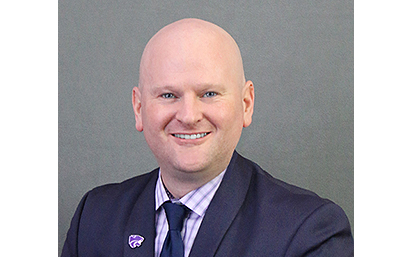
Kansas State Polytechnic welcomes new executive director of enrollment management and marketing
Kansas State University Polytechnic Campus has hired a new leader to transform prospective students into Wildcats.
Christopher Smith, former director of admissions for two DeVry University locations, joins Kansas State Polytechnic as the new executive director of enrollment management and marketing. Smith, from McPherson, Kansas, started his role at the beginning of October and is tasked with supervising the operations of both the admissions and communications and marketing offices. His primary focus is on increasing brand awareness and creating new recruiting strategies, with an overall objective of growing enrollment.
“We are proud to welcome Dr. Smith and his years of experience in student recruitment to the Polytechnic Campus,” said Verna Fitzsimmons, dean and CEO of Kansas State Polytechnic. “His extensive knowledge of the consultative approach to enrollment, which centralizes the student experience, aligns perfectly with our campus’s polytechnic approach to education. It will be exciting to watch Dr. Smith’s fresh perspective and new ideas elevate our engagement with potential Wildcats.”
A native of Savannah, Georgia, Smith was working in the hospitality industry as the owner and operator of an upscale wine bar and restaurant when he transitioned into higher education. After selling his establishment, he started recruiting culinary students to The Art Institute of Charlotte as an assistant director of admissions.
Before joining Kansas State Polytechnic, Smith spent eight years as director of admissions for DeVry University and its Keller Graduate School of Management at both the Charlotte and Raleigh, North Carolina, locations. He was responsible for leading a team of undergraduate and graduate admissions advisers, meeting enrollment goals every term, managing profitability and developing talent. Smith was recognized for his success and leadership within the institution with the Legacy of Service honor and DeVry’s top accolade, the Pride Award.
“When I started working in admissions, I realized early on the kind of impact it has on someone’s future,” Smith said. “In admissions, you are on the front lines directly helping prospective students with their educational and professional goals, and I’m excited to continue serving students through this next step in my career at Kansas State Polytechnic.
“I am impressed by the campus’s ‘learning-by-doing’ mentality and concentration on professional degree programs because I believe relevant, real-world experiences resonate with the next generation,” he said. “With this innovative educational style and an enhanced recruiting approach, I am confident Kansas State Polytechnic will stand out among other institutions of higher learning.”
Smith sees several areas of opportunity to grow enrollment at Kansas State Polytechnic, including connecting with a more diverse population of students and utilizing a consultative method from inquiry to admittance. Smith wants the focus to always be on the student because he says every student’s situation is different and by understanding their true needs and motivations, Kansas State Polytechnic can build trust and provide real value.
Smith has a Doctor of Philosophy in education with a concentration in higher education leadership from Capella University. He earned a master’s degree in organizational management from the University of Phoenix and a bachelor’s degree in political science with a criminal justice minor from Valdosta State University.
College of Veterinary Medicine
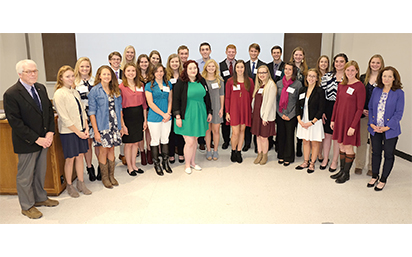
Veterinary college welcomes 2017 class of Early Admission Scholars
A group of 27 Kansas State University undergraduate students will have a special opportunity to fulfill their dreams of becoming veterinarians. The College of Veterinary Medicine recognized these students for being selected in its Early Admission Program during an afternoon ceremony Oct. 27 in Trotter Hall.
Established in 1999, the Early Admission Scholars program has recruited the best and brightest undergraduate students who are interested in studying veterinary medicine. Upon acceptance in the program, students must complete all of their science prerequisite courses at K-State to be guaranteed admission into the College of Veterinary Medicine.
“Qualifying for this program is very special,” said Dr. Ronnie Elmore, associate dean for admissions and diversity programs. “These students represent the top 5 percent of Kansas State University students according to their college acceptance test scores. Being selected into the Early Admission Program gives them the advantage of bypassing the regular applications process, which is very competitive. For only 112 positions in each incoming veterinary class, we usually receive more than 1,000 applications.”
Successful candidates in the Early Admission Scholars program must maintain a 3.5 grade point average during completion of the science prerequisites and complete all of their 64 hours of prerequisites by the end of the spring semester prior to beginning the DVM curriculum in the fall, and submit graduate record examination (GRE) scores.
The College of Veterinary Medicine assigns a veterinary student mentor to each Early Admit Scholar to stimulate career and academic development and to provide orientation and access to college activities. The pre-veterinary students attend regular meetings during the academic year to develop a sense of community and share their progress.
Photo: Front row (from left): Dr. Ronnie Elmore, Bailey Pyle, Amanda Tlacil, Samantha Jansen, Cori Hough, Amelia “Amy” Finn, Taylor McAtee, Angela Gaggiano, Shelby Abts, Hanna Westermier, Halle Kloefkorn, Margo Wottowa and Dr. Bonnie Rush. Back row: Abigail Gibbons, Nathan Jackson, Allianna Mitchell, Emma Hawkins, Alexis Fenton, Rachael Peterson, Walter Meyers, Douglas Farleigh, James Osborn, Joseph Kempin, Dylan Albers, Molly Reilly, Annaliese Colacicco, Katherine Stenger and Hannah Tice. Not pictured: Levi Gauby. (Courtesy photo)
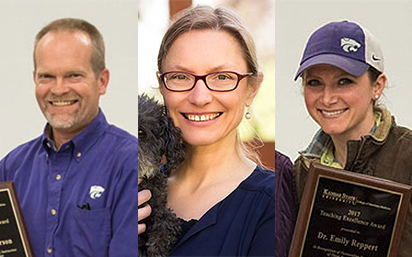
Touting a terrific trio for their teaching talents and tenacity
Three faculty members have been recognized for preclinical teaching excellence in the College of Veterinary Medicine. Drs. Robert Larson ’85, ’87, ’92, Lisa Pohlman and Emily Reppert were each named as the respective top teachers for the first, second and third years of instruction, as voted on by each respective class of students at the end of the 2016-17 school year.
“These pre-clinical teaching awards began in 2004 as part of an effort by the college to recognize exceptional teaching at every stage of the veterinary curriculum,” explained Dr. Peggy Schmidt, associate dean for academic programs and student affairs. “Students have chosen these faculty for their exceptional teaching and dedication to student learning. This year’s recipients are outstanding educators and well deserving of this recognition.”
Dr. Larson was named the recipient of the 2017 Boeringer Ingelheim Teaching Excellence Award, which is presented in recognition of outstanding instruction of first-year veterinary students. He earned his doctor of veterinary medicine degree in 1987 and a doctorate in 1992, both from Kansas State University. He has been a professor of food animal production medicine since 2006 and holds the Coleman Chair in Food Animal/Production Medicine.
“I have the privilege to teach highly motivated and talented students,” Dr. Larson said. “I feel blessed to be able to have a career where my love for veterinary medicine and my enjoyment of seeing bright students comprehend challenging subjects are rewarded on a daily basis.”
Dr. Pohlman was given the 2017 Teaching Excellence in the Second Year Award in recognition of outstanding instruction of second-year veterinary students. She is currently on sabbatical and will be presented with the award at a later date. She earned her Doctor of Veterinary Medicine degree from the University of Guelph, Canada, in 2001 and a master’s degree from Auburn University in 2007.
“It is wonderful to be able to teach veterinary students in a discipline that I am so passionate about,” Dr. Pohlman said. “I would also like to express my gratitude to the team I had behind me in putting this course together — the clinical pathology group, Gina Scott and Mal Hoover ’78 — for all their assistance and creativity.”
Dr. Reppert received the 2017 Teaching Excellence in the Third Year Award sponsored by Zoetis. She earned her Doctor of Veterinary Medicine degree from Colorado State University in 2010. She then completed an internship and a residency in food animal internal medicine and surgery at Oklahoma State University. While at Oklahoma State University, Dr. Reppert completed a master’s degree in 2014.
“I am incredibly flattered to be honored with this award and would like to thank the students for selecting me,” Dr. Reppert said. “I am grateful to have the opportunity to work with faculty and house officers that are dedicated to training the very best veterinarians.”

